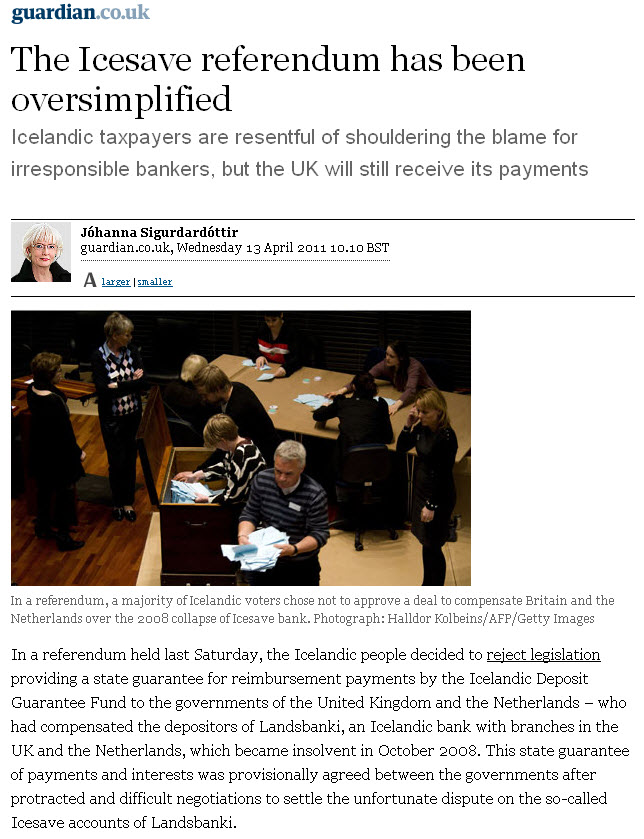Article by the Prime Minister of Iceland regarding the referendum on 9 April, published in Guardian today
In a referendum held last Saturday, the Icelandic people decided to reject a legislation providing a state guarantee for the reimbursement payments by the Icelandic Deposit Guarantee Fund to the governments of the United Kingdom and the Netherlands – who had compensated the depositors of Landsbanki, an Icelandic bank with branches in the UK and the Netherlands, which became insolvent in October 2008. This state guarantee of payments and interests was provisionally agreed between the governments after protracted and difficult negotiations to settle the unfortunate dispute on the so-called Icesave accounts of Landsbanki.
This outcome means that another chapter will be added to the Icesave saga, which all three governments had aimed at bringing to an end after good-faith negotiations. The matter will now be settled through ajudication by the competent courts – an outcome which was always an option in such a difficult matter, and indeed the preferred option in the eyes of many Icelanders.
The Icesave matter is complex and it is perhaps understandable that the issue has been oversimplified by many. Unfortunately some of the basic facts of the matter have been unilaterally interpreted, and sometimes distorted, giving rise to unjustified criticism of conduct of the Icelandic authorities. Allow me therefore to make just two observations:
First, it is important to note that the Landsbanki estate is being wound up in accordance with Icelandic and European law. The referendum outcome will not interfere with this process.
Distributions from the Landsbanki estate are scheduled to commence this summer providing the Netherlands and the United Kingdom with substantial payments towards the compensation payments those governments made to depositors in their countries. Latest estimates suggest the asset recoveries of Landsbanki will cover more than 90% of deposit claims, and there are strong indications that they may cover such priority claims in their entirety.
Secondly, the government of Iceland has always said it would honour its international obligations, but there is a great deal of uncertainty as to what these alleged “international obligations” entail in actual fact – opinion on and interpretation of the European directive in question is highly disputable. Therein lies the problem. The referendum outcome means that the Icelandic people will not accept a requirement to cover costs related to deposit insurance guarantees, unless the legal obligation for doing so is clear and unequivocal.
This sentiment among the Icelandic public is quite understandable and is presumably a sentiment shared amongst the public all across Europe in the aftermath of the financial crisis.
People ask themselves: why do we as taxpayers have do shoulder the burden of problems caused by the behaviour of irresponsible bankers? Taxes should be used for public services, for the welfare of ordinary citizens, but not because of huge losses of financial institutions.
This means that irrespective of any judicial process which may now be required to settle the nature of this obligation, the United Kingdom and Netherlands will receive payments from the Landsbanki estate which may even cover all of their compensation payments to depositors. It is clear to the Icelanders – and indeed it is a source of frustration – that the ruling of a court may not be in Iceland´s favour, and may have dire consequences. The Icelandic electorate was presented with two evils last Saturday; to assume a responsibility they believe is not theirs, or to risk a verdict that may be heavy to carry.
The article in Guardian: www.guardian.co.uk/commentisfree/2011/apr/13/icesave-referendum-uk-payments/print

